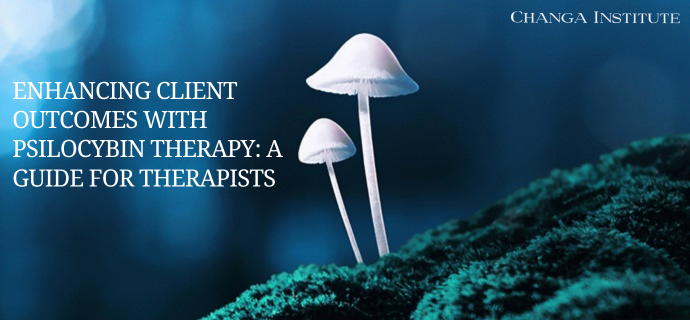Enhancing Client Outcomes with Psilocybin Therapy: A Guide for Therapists
Psilocybin therapy is gaining attention for potentially transforming client outcomes in therapeutic settings. This guide is designed to provide therapists with practical insights on integrating psilocybin into their practice, offering a fresh perspective on client care and guiding them in exploring this innovative therapy.
By understanding its benefits and how to apply them effectively, therapists can enhance their approach and support their clients in new, meaningful ways.
What is Psilocybin Therapy?
Psilocybin therapy involves using psilocybin, a natural compound found in certain types of mushrooms, to help clients work through mental health issues. When administered in a controlled, therapeutic setting, psilocybin can lead to profound changes in mood, perception, and thought processes, making it easier for clients to confront deep-rooted emotions and experiences.
This approach is gaining recognition for its potential to treat conditions like depression, anxiety, PTSD, and addiction. What makes psilocybin therapy unique is how it promotes introspection and emotional release, leading to lasting shifts in perspective.
By working through difficult emotions in a safe space, clients can achieve significant psilocybin therapy outcomes, such as increased clarity, reduced symptoms, and overall mental well-being. As more research supports its effectiveness, psilocybin is a valuable tool for enhancing client care.
How Does Psilocybin Work in Therapy?
Psilocybin interacts with serotonin receptors in the brain, especially in mood, perception, and cognition. When ingested, psilocybin converts to psilocin, influencing neural pathways, promoting new connections, and enhancing emotional processing.
This allows clients to confront past traumas and shift negative thought patterns. The result? More open and meaningful therapy sessions often lead to improved psilocybin therapy outcomes.
How Long Does Psilocybin Stay in Your System?
Psilocybin typically stays in your system for about 1 to 3 days, though this can vary based on several factors. While psilocybin converts quickly to psilocin (which leaves the body faster), traces may still be detectable depending on the testing method.
Key factors that influence how long psilocybin stays in your system:
Dosage: Higher doses can take longer to clear.
Metabolism: Individuals with faster metabolisms process psilocybin more quickly.
Body composition: Weight, hydration, and overall health can affect elimination.
Frequency of use: Regular users may retain psilocybin longer.
The Benefits of Psilocybin Therapy for Clients
Psilocybin therapy offers several unique benefits for clients, particularly when traditional therapy methods may fall short.
Promoting deeper emotional connections and personal insights can greatly improve psilocybin therapy outcomes.
Emotional Breakthroughs
Psilocybin can help clients access repressed emotions, making confronting and processing difficult experiences easier. This leads to more profound emotional breakthroughs compared to traditional talk therapy.
Reduced Anxiety and Depression
Studies show that psilocybin can significantly reduce symptoms of anxiety and depression, especially in clients resistant to conventional treatments.
Enhanced Self-Awareness
Clients often experience heightened self-awareness and introspection, helping them understand their behavior patterns and make lasting changes.
Long-Lasting Results
Unlike some therapies that require continuous sessions, psilocybin therapy can lead to lasting positive changes in just a few sessions, contributing to more sustainable mental health improvements.
Overcoming Therapy Resistance
For clients who struggle to open up in traditional settings, psilocybin can lower psychological barriers, allowing for deeper engagement and improved outcomes.
Best Practices for Therapists Using Psilocybin Therapy
Integrating psilocybin therapy into your practice requires thoughtful preparation, careful session management, and supportive post-session care.
Here are some best practices to ensure enhancing therapy results:
Thorough Client Preparation
Ensure clients are well informed about what to expect during the session. Discuss goals, potential emotional responses, and any concerns they may have. Creating a safe, supportive environment before the session begins is key.
Safe and Supportive Setting
Choose a calm, comfortable space for the session, free from distractions. Encourage clients to bring familiar items that provide comfort, such as blankets or meaningful objects.
Guiding with Care During the Session
Stay present and attentive without being intrusive. Encourage the client to explore their emotions while offering gentle guidance when necessary. Avoid steering the experience, as each client's journey is unique.
Post-Session Integration
Help clients process their experience afterward by scheduling follow-up sessions to discuss insights gained. Encourage journaling or mindfulness practices to integrate these lessons into their daily lives.
Ongoing Support
Provide continuous emotional and psychological support in the weeks following therapy. This ensures clients can maintain and build on the positive psilocybin therapy outcomes experienced during their sessions.
FAQs
1. How long do the effects of psilocybin last during a therapy session?
The effects of psilocybin typically last between 4 to 6 hours, depending on the dosage and the individual's metabolism. However, the emotional and psychological benefits can continue long after the session.
2. Is psilocybin therapy safe?
Psilocybin therapy is considered safe when administered in a controlled, therapeutic setting by a trained professional. Proper preparation, guidance, and post-session care are essential to ensure a positive experience and maximize psilocybin therapy outcomes.
3. Can psilocybin help with treatment-resistant depression or anxiety?
Yes, psilocybin has shown promising results for individuals with treatment-resistant depression and anxiety, helping clients achieve significant emotional breakthroughs and enhancing therapy results where traditional treatments may have failed.
Conclusion
Psilocybin therapy offers a transformative approach to mental health, helping clients achieve emotional breakthroughs and lasting improvements. Therapists can significantly enhance client outcomes with proper preparation, guidance, and follow-up care.
As research continues, psilocybin therapy holds great promise for improving mental well-being in a meaningful, lasting way.

